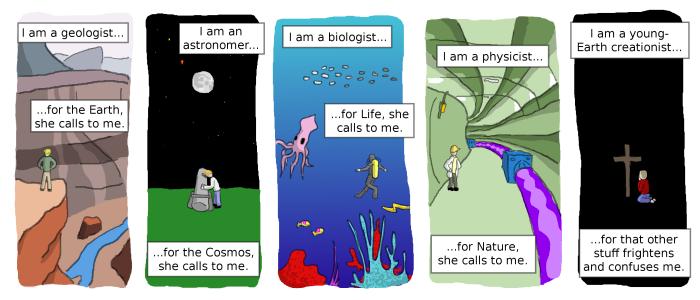@ LoLmart:
No. There is a bit of a misconception there. Scientifically, given the observations from testing mammalian brains (for example, in cognitive neuroscience the focus is often on how brain damage can affect cognition OR even how malfunctions are tied to certain disorders, eg. overactive projection of dopamine in the basal ganglia is linked to schizophrenia) and the fact that only what is physical can be observed and/or measured, the mind has to arise from matter and consciousness has to be the epiphenomenon of brain function as far as identifying neural correlates and interpreting them to be the cause is concerned.
Admittedly, we don't yet have a physical explanation for consciousness (but this doesn't mean that a metaphysical explanation is a real explanation, because, after all, how can something non-physical interact with the physical and to be honest, I find the term "non-physical" to be absurd in justifying the physical action of something that exists).
It is known, however, that we can have different degrees of consciousness and these can be measured (such as unconsciousness, dreaming, waking and phase states). There is more on measuring consciousness here, which, as you'll see, isn't simple. But then again, what would one expect given the fact that the brain is the most complex organ we know:
http://www.ncbi.nlm.nih.gov/pmc/articles/PMC2767381/
Consensus is still out about what could cause the mind and consciousness to emerge. There have been recent suggestions that quantum mechanics is involved, but, Christof Koch (a neuroscientist who has been recently trying to locate the neural correlates of consciousness) dismissed the theory as insubstantial (arguing that states arising from such source would not stay coherent for long enough) and has decided that we can now begin to understand consciousness using modern tools whilst applying the reductionist approach.
In the following link, Koch attempts to clarify the problem of qualia by outlining neural correlates of consciousness in terms of competing cellular assemblies. Detailed neural activities must also be investigated on very fast time scales which is difficult to do. What can certainly be derived from the study so far is that our cerebral systems are highly evolved (thus being very good at detecting apparent causation), and not surprisingly so, because, we have had enough time in evolution. Anyway, I'm hoping this expert will shed more light on the subject in the near future:
http://www.klab.caltech.edu/Papers/438.pdf
With all this in mind, and more to the topic of this now wonderfully rich thread, one could posit that what is experienced in the phase is mostly originating from those cortical networks wholly responsible for 'guessing' and 'filling in' when the information received by the senses is incomplete. In the phase state, of course, they are encouraged to create a new reality (since sensory input is scarce or absent). But the guessing and filling in isn't just visual (or the rest of the senses), it also centres around expectation (again, going back to the Koch link, when we 'jump to conclusions' is a good example). It is also worth taking into account that we are not conscious of all of our actions, thoughts or even all that we know - the phase state practice is certainly one way to raise awareness of what we are in terms of the mind and perhaps in the future we will be even more consciously aware in the waking state if we take that biological turn in evolution.
A lot of what we know so far has been experientially observed which has led to a whole range of theories. A reminder here that the meaning of theory in science is the highest point in comprehending something, and this gives to falsifiable predictions. So, to conclude, the research goes on.
What I won't do is jump to metaphysical conclusions just because science is still currently trying to understand the phenomenon. If I did, it would be the equivalent of a maturing child ignoring possible physical events that explain the arrival of Christmas presents and having faith on the baseless Santa Claus hypothesis. I believe there is a physical basis for everything because that is what I have experienced so far and so far that is what our science tells us. Some things do not appear to have a cause, granted, but, they always have a basis (these stand on natural laws). We are only here and conscious of our existence because our hostile and impersonal universe made it possible on a slim chance.
That's my take until a new scientific discovery shifts my paradigm.
@ breadbassed:
No. Reincarnation implies that a spirit leaves a bodily shell to enter a new body and live another life. I say there is no spirit. The rebirth is due to that fact that the coordinates in space eventuate the awareness once again, the sense of self (self here is not an entity, only a sense). But even this as a possibility is hypothetical and only based on the fact that A) we once didn't exist and yet we were born; and B) the theory that we are all one mind (as a phenomenon that arises in space like gravity) but we see from different perspectives - giving rise to the illusion of individuality. Again, these are nothing but ideas, and, for all I know, we die and don't come back (more likely than not based on the analogous premise that the time entanglement of two quantum particles (where they are entangled but separated by time) does not mean that the new particle is the one that died - only that a 'copy' has been recreated via interactions - the same could be the case for consciousness).
I commented on the so-called *coughs* God equation on a different thread:
On the "God" equation... since when does coincidence imply the existence of God? The equation is the result of mathematical structure where various branches of it unavoidably intersect. The equation can be used to define complex logarithms where it is useful as these have multi-valued functions.
Benjamin Peirce, who philosophically expressed his awe at Euler's equation, was a theist who saw everything in support of his worldview. Anyone can point at something which is amazing and credit a metaphysical being - it doesn't make it so though. Likewise, the equation can be used to back the atheistic stance. You will not find the answers to anything in Hockney's series of books, only biased reinterpretation of what is already known to be true. Again, Euler's equation is not proof of a divine creator or intelligent design.
Once again, creationists attempt to use and twist something veridical in an attempt to support their unfounded ideas. Talk about filling in the gaps with something metaphysical in order to explain the things that we don't YET understand about nature. It is nothing but surmising, not explaining. The universe is the way it is because it can be, if there is a chance, then it has potential to manifest so. It does not mean that a God engineered it in the way that we know it.
Furthermore, the book attempts to assassinate science and distort facts. For example, gravity is generally considered to be a weak force in physics but it manifests in different intensities depending on how
massive objects are in space (not, as it implies, gravity as a constant law makes the universe fine-tuned to bear life - I can assure you that the universe is anything but that considering that we only live due to a thin atmospheric layer naturally enveloping a 'tiny' grain in space). And let's remember that this will either lead to cold, hot, dark or shiny objects (not to mention that physics predicted the Chandrasekhar limit with calculations before being confirmed as an established truth). There is diversity, you see. It is also preposterous to mention intelligence along the same lines as "angelic" and "divine". And if you think complexity is evidence of intelligent design, then it is you who needs to listen to this:
http://www.youtube.com/watch?v=ba2h9tqNYAo

The book is utter tripe.

THE PHASE = waking consciousness during sleep hybridisation at 40Hz of brainwave activity conducive to lucid dreaming and autoscopy.






